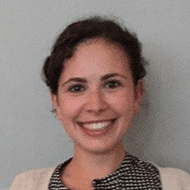Nascent Transcript writer Brooke Wolford interviewed Rachel Gore, who will be a 2018 graduate of the Johns Hopkins University/NHGRI Genetic Counseling Training Program.
August 2017

(Courtesy Gore)
Genetic counselors are an integral part of the American Society of Human Genetics, with a perspective that informs and inspires both science and policy, complementing the work of PhD and MD geneticists.
Rachel Gore of Baltimore, Maryland, is a rising third-year trainee in JHU/NHGRI’s Genetic Counseling Training Program, which combines didactic instruction with clinical and research training to prepare trainees for diverse career paths in genetic counseling. Originally from Massachusetts, she received a BA in Biology at Clark University in Worcester. Answers from a phone interview with Rachel have been edited for clarity and brevity.
ASHG: What motivated you to pursue a career in genetic counseling?
Ms. Gore: I heard about the field of genetic counseling in college. As a biology major, my main focus was genetics, and I worked in a research lab studying a signaling protein in Drosophila. I liked some aspects of that work but realized I wanted a career that involved one-on-one patient interaction. Genetic counseling was an interesting way to combine my interests in psychology and counseling with genetics.
ASHG: What are your future career goals?
Ms. Gore: I am hoping to start a clinical position after graduation, working with cancer or pediatric genetics. Although clinical care will be my primary role, I am really interested in incorporating research into whatever I do. Luckily, there are plenty of opportunities for that within genetic counseling. For example, my training program provides extensive training in social and behavioral research. My thesis work attempts to understand barriers to the informed consent process for whole exome sequencing. I performed a systematic literature review to look at challenges from patient and provider perspectives. I am also deploying a survey to the National Society of Genetic Counselors to understand how counselors are thinking about the informed consent process.
ASHG: How do you see the field of genetic counseling evolving as genetic testing and whole genome sequencing become ubiquitous?
Ms. Gore: While facilitating genetic testing is a part of genetic counseling, there are many other aspects of counseling that are essential and will not be fundamentally changed by advances in testing. For many patients, appropriate testing may not be available or indicated, or may not be the right option based on their healthcare goals. Genetic counselors have always had, and will continue to have, an important role in helping patients adapt to the implications of a diagnosis and make informed decisions about their health regardless of whether that includes genetic testing.
However, because the realm of genetic testing is changing a lot, it will likely become a more prominent part of primary care across the board. In addition, direct-to-consumer testing is already being implemented and has generated significant public interest. The challenge for genetic counselors is to continue to use our unique set of skills where they are most applicable. Since our field is fairly small, we need to figure out how to best utilize our workforce so people who need in-depth counseling are able to get it. Perhaps we will shift away from ordering straightforward genetic tests and become more involved in interpreting ambiguous test results or making preventative health decisions, particularly for challenging cases. We can use our unique skills of interpreting complex genetic information and communicating that information to those who need our services the most. It is important to embrace the fact that genetic testing is becoming more ubiquitous and not be resistant to the change. The best thing we can do is adapt to it and stay abreast of all the changes while still remembering what makes genetic counseling what it is—a focus on our patients and clients.
ASHG: How do you see medical geneticists, PhD genetic scientists, and genetic counselors collaborating in the future?
Ms. Gore: I have seen a lot of collaboration in different contexts and think it is awesome. Moving forward, a big question in the field is how to interpret variants from whole exome sequencing and other new technologies. To answer that question, we need all three perspectives to make guidelines that will work on all levels. For example, we need knowledge about biochemical changes and classifying variants from PhD scientists, we need genetic counselors to think about how returning results influences patients, and we need medical geneticists to shape how these results influence diagnoses.
ASHG: What is the most pressing issue in your field that your ASHG colleagues should know about?
Ms. Gore: One of the things that is most exciting about genetics is keeping up with all the changes, but since technology is growing exponentially, it is a challenge to help patients navigate all of these changes. How do we provide medical care that keeps up with changing technology and remain focused on effectively communicating these changes to the patients, while also helping them make informed decisions about their healthcare?
ASHG: What advice do you have for someone interested in pursuing a career in genetic counseling?
Ms. Gore: Reach out to a genetic counselor in the area or a student at one of the country’s genetic counseling programs! We are always enthusiastic about getting interested people involved in our somewhat small field. There are many aspects to genetic counseling that translate into many different career opportunities. Even if people aren’t as interested in the clinical practice of seeing patients, there are opportunities in clinical or basic research or in diagnostic laboratories. I want people to be aware that there is flexibility in genetic counseling, so you can really shape your own career!
